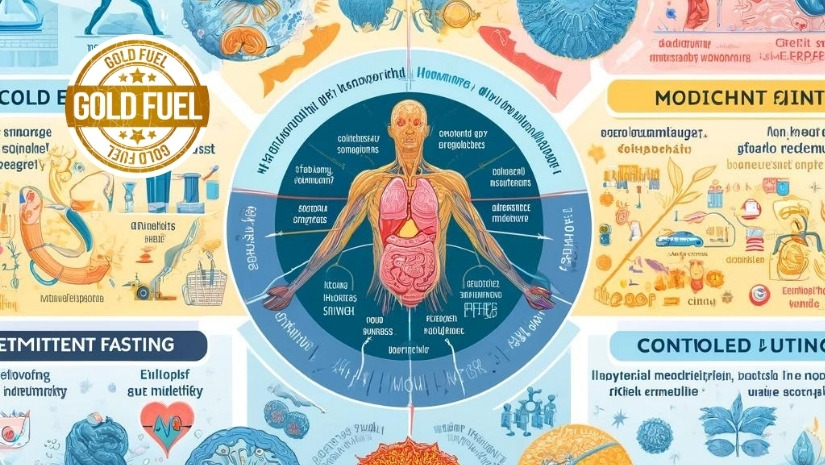
In biology, hormesis refers to an apparently counterproductive but beneficial adaptive response to exposure to stress or to low doses of a putative toxin. In other words, moderate or low levels of bodily or psychological stress can stimulate the organism to restore vitality and regain strength to better withstand the full force of the stressful challenge.
Concerning longevity and health span, this means that intentional and measured stressors such as physical exercise, caloric restriction and/or selected phytochemicals can activate cellular signaling pathways that enhance repair mechanisms, metabolic flexibility and/or disease resistance. This preliminary primer on hormesis explains why the things that don’t kill you can make you stronger with respect to lifespan and health.
What is Hormesis and How Does it Benefit Us?
Hormesis is the beneficial effects of small amounts of stress or low doses of toxic substances on our bodies. It works by triggering adaptive responses that strengthen our stress tolerance, repair mechanisms and overall resilience. It’s like a workout for your cells, making them stronger and more capable of handling future challenges.
Hormesis Is an Adaptive Response
Evolutionarily speaking, different mechanisms observed among organisms have emerged mainly to improve survival under adverse conditions. Caloric restriction, environmental stress and restricted energy have been the most challenging and common forms of life on Earth throughout history.
In fact, survival under calorie-rich conditions has been much less common than those in which organisms were forced to live in a depleted and conserved state. This was an obligatory form of life for survival under frequent adverse environments. In this conserved state, species were able to establish potentially longevity-promoting metabolic states. Organisms have evolved to find the best metabolic states to maximize survival over time.
The biological principle to this is called ’HORMESIS’ which is derived from the Greek word hórmēsis and it is the ‘rapid motion, eagerness’ or ‘to set in motion.’ In other words, hormesis is a biphasic response to a toxin or a stressor. The first phase causes injury to the body upon contact. The second phase leads to adaptation leaving the body better off than it was prior.
Hormesis and Longevity
Hormesis is a biological concept where a little bit of stress can be good for the body and mind and increase health and longevity. This is seen across all areas of life, from physical activity to diet to environmental exposures. Here’s how different types of hormesis can benefit us:
- Physical Exercise: Doing physical activity, especially intense ones like weightlifting or high-intensity interval training (HIIT) induces oxidative stress. And guess what, this stress is good as it makes the body adapt by increasing mitochondrial density and mitochondrial biogenesis. So exercise not only strengthens the muscles but also increases cellular energy production and efficiency.
- Alcohol: Moderate alcohol consumption, like a shot of vodka or a glass of wine once a week is sometimes considered hormetic as it’s thought to prevent heart disease and stroke. But the benefits of alcohol can be overstated and excessive consumption is clearly bad for health like liver disease and neurotoxicity. So moderation is key and for some, abstinence might be the healthiest choice.
- Sunlight: Moderate sunlight is a way to naturally synthesize Vitamin D and support bone health and other metabolic processes. Excessive sun exposure can cause skin damage and increase cancer risk but a balanced approach can harness the benefits without the harm, making it a classic example of hormesis.
- Cold: Cold exposure can activate AMPK and stimulate mitochondrial growth and efficiency. This adaptation not only increases energy metabolism but also reduces inflammation, boosts immune function and increases pain tolerance.
- Heat: High temperatures activates heat shock proteins that help cells withstand the harmful effects of heat stress. This type of hormesis also stimulates the lymphatic system to detoxify and regulate fluids in the body.
- Caloric Restriction and Intermittent Fasting: Caloric restriction and intermittent fasting induces mild oxidative stress which activates sirtuin proteins. Both practices not only increases lifespan but also being studied to improve cancer treatment outcomes by making cells more resilient to the stresses of chemotherapy.
- Mental Stress: Mental stress can also be hormetic if managed well. Doing challenging mental activities and adapting to high stress situations exercises the brain to improve its ability to handle future stress and cognitive function.
Is There a Safe Level of Drinking That’s Hormetic?
While moderate drinking, like a glass of wine every now and then, has been touted for heart health benefits, the idea of drinking as a hormetic agent is controversial. The key is moderation. Small amounts might be beneficial but excessive drinking negates the benefits and is harmful. So drink wisely and within limits.
When you’re in a tough spot in your life or going through tough times, please remind yourself “it’s okay” – this will make me stronger in the future – then you’ll not only have more strength for the present moment but anything else too. Right?
Can Exercise Be a Form of Hormesis?
Absolutely! Exercise induces mild oxidative stress which in turn activates molecular pathways that improve mitochondrial function, metabolic health and cellular repair. It’s a classic example of hormesis, exposing the body to controlled stress to get long term benefits.
How Does Cold Exposure Contribute to Longevity?
Cold exposure activates AMPK and other pathways that stimulate mitochondrial biogenesis and efficiency. This adaptation not only helps with energy metabolism but also has systemic benefits like reducing inflammation, improving immune function and increasing pain tolerance. Regular controlled cold exposure can train the body to be more resilient and efficient in its physiological processes.
What Role Does Intermittent Fasting Play in Hormesis and Longevity?
Intermittent fasting is a dietary approach that involves eating and fasting in cycles. It induces mild oxidative stress, like exercise, which activates cellular defense mechanisms including autophagy (the body’s way of cleaning out damaged cells) and sirtuins, proteins involved in cellular health and longevity. This can lead to better metabolic health, reduced inflammation and potentially longer life.